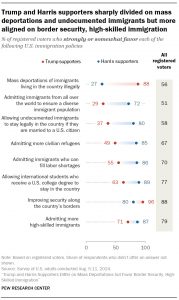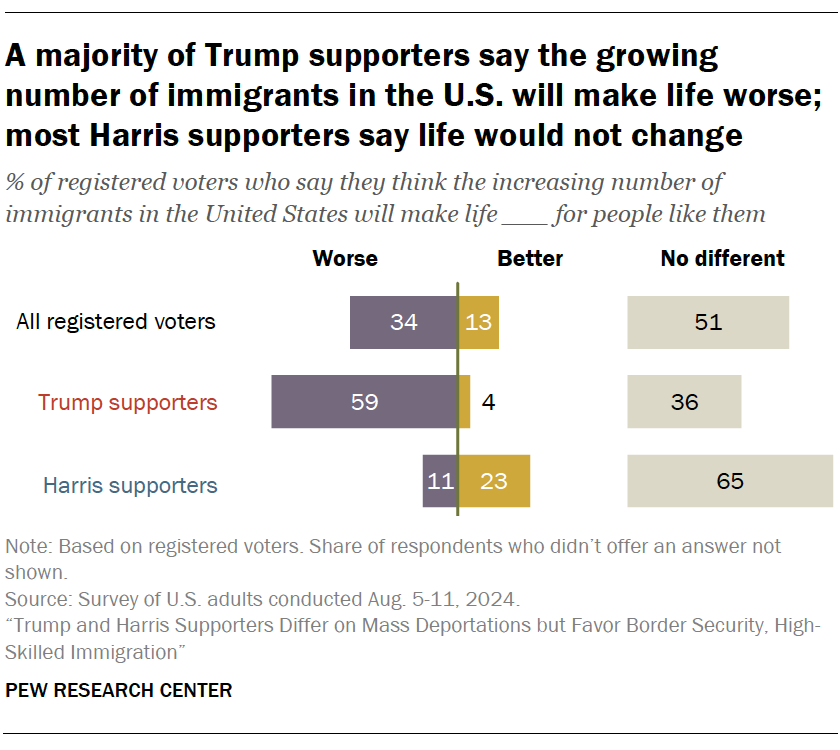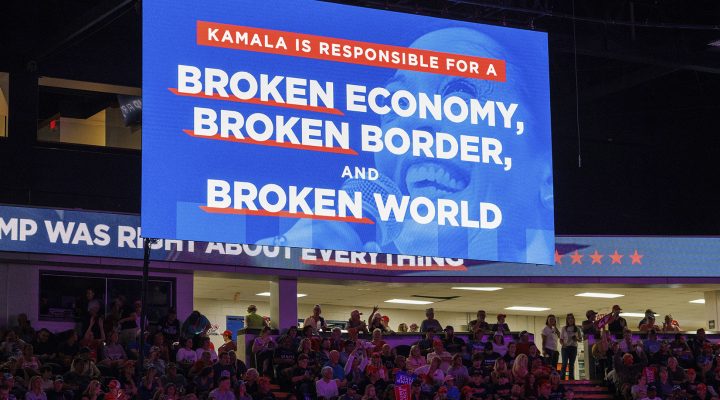Donald Trump’s anti-immigrant policies have so reshaped the Republican Party that the party once known as being driven by business interests nearly wholeheartedly favors a policy that would wreck the U.S. economy.
That policy is mass deportation of immigrants living in the country illegally.
Trump has pledged if elected president again, he will conduct “the largest domestic deportation operation in American history” to expel 11 million people with aid of local law enforcement, the National Guard and the United States Armed Forces.
 New polling by Pew Research shows 88% of Trump supporters favor this mass deportation plan, compared to 27% of Harris supporters. Pew found 72% of Harris supporters oppose the mass deportations.
New polling by Pew Research shows 88% of Trump supporters favor this mass deportation plan, compared to 27% of Harris supporters. Pew found 72% of Harris supporters oppose the mass deportations.
It hasn’t always been this way. Previous Republican presidents and candidates took much more compassionate views on immigration, including conservative icon Ronald Reagan.
Beginning with his 2016 campaign, however, Trump recast the narrative — tapping in to growing anxiety among white laborers about a shifting job market and blaming immigrants for taking their jobs. Even though legitimate research fails to support this as reality.
In Trumpism, immigrants became the scapegoats to explain much more complex changes in the economy and global business practices and employment opportunities. All the while, Trump the businessman was part of the problem, producing nearly all his family’s branded products overseas, not with American labor.
And as president, he presided over even greater outsourcing of American jobs to overseas markets.
While campaigning to save American jobs, Trump actually has had the opposite effect. And his plan to deport 11 million immigrants will not have the desired effect, either, according to economic studies.
An economic projection
The latest of those comes from the Peterson Institute for International Economics, which finds “mass deportations would lower U.S. GDP and reduce employment through 2040, compared with what would happen if the policy were not implemented.”
Researchers Warwick McKibbin, Megan Hogan and Marcus Noland use econometric modeling to generate a baseline forecast for variables including GDP, employment and inflation in 24 countries and regions. They projected the effects of three of Trump’s policy proposals — mass deportations, tariffs and weakening Federal Reserve independence.
The researchers note the economic study happened “separate from the worrying humanitarian and moral costs such actions would have.”
They looked at two variations on Trump’s deportation plan, one deporting 1.3 million people and another deporting 8.3 million people.
“Both scenarios cause lower U.S. GDP and employment through 2040 than the baseline projection,” they conclude. “In other words, compared with what would have happened without the deportations. The scenarios differ only by the degree of damage inflicted on people, households, firms and the overall economy.
That damage could range from a 1.2% drop in GDP to a 7.4% drop.
Among other things, that means there would be “no economic growth over the second Trump administration from this policy alone.”
“The Trump campaign assumes that employers would simply replace the deported workers with native workers, but the historical record shows that employer behavior is far more complicated than that.”
Here’s why Trump’s idea is wrongheaded, they note: “The Trump campaign assumes that employers would simply replace the deported workers with native workers, but the historical record shows that employer behavior is far more complicated than that. Past experience with deportations demonstrates that employers do not find it easy to replace such workers. Instead, they respond by investing in less labor-intensive technologies to sustain their businesses, or they simply decide not to expand their operations. The net result is fewer people employed in key business sectors like services, agriculture and manufacturing.”
And, those illegal immigrants aren’t just workers, they’re also consumers.
“Deporting them means less demand for groceries, housing, services and other household needs. This lower spending in turn reduces demand for workers in those sectors. That reduced demand for workers in all types of jobs outweighs the reduction of supply of unauthorized workers.”
Thus this conclusion: “Contrary to the Trump campaign’s assumption that deporting workers increases domestic employment, removing immigrants reduces jobs for other U.S. workers.”
That, in turn, would increase inflation.
“In addition to the moral issue of rounding up millions of people, and disrupting their families, workplaces and livelihoods, Trump’s ‘America first’ proposal for mass deportations would raise prices, cost jobs and harm the US economy,” the researchers state. “Other policy proposals, like high tariffs and eroding Federal Reserve independence, are projected to deal an economic blow as well.”
These findings echo other studies and projections created by economists much smarter than Donald Trump.
According to one such description: “Instead of freeing up employment opportunities, findings from one study suggest that the deportation of 11 million undocumented immigrants could result in 968,000 fewer jobs available for US citizens, losses that would be compounded each year the policy remained in effect.”

Why believe an economic lie?
So why has the “party of business” been taken in by a philosophy that would instead be harmful to business?
The social reasons are complex and include what David Jordan and I have written about previously regarding the false assumption that Trump is a “good businessman” instead of the con man he actually is.
At root is a fear of “the other,” particularly as white male privilege nears extinction due to demographic shifts. Robert P. Jones and others have explained this idea over and over. It’s still true.
Also consider this: Immigrants now make up about 14.3% of the U.S. population, a near-record high. Nearly three-quarters of registered voters say they know someone who was born outside of the United States.
Back to the new Pew data: “Trump supporters have a much more negative view of the impact of illegal immigration. An overwhelming majority of Trump supporters (92%) say immigrants living in the country illegally make crime worse, compared with 37% of Harris supporters.”
This while 69% of Trump supporters say immigrants living in the country legally either make the economy better or don’t have much of an effect on it. Only 29% of Trump’s own supporters say these immigrants make the economy worse.
Yet their irrational fear of what Trump has called “rapists and thugs” so overpowers the economic reality they can see that they are willing to bet the farm based on fear.
This explains why Trump and his sidekick JD Vance keep telling lies about Haitian immigrants in Ohio and now Haitians in Pennsylvania — two battleground states. It’s not really about the economy; it’s about fear of Black and brown immigrants.
If today’s Republican Party really was driven by economic policy, it would harness the labor force of illegal immigrants and convert them to be both producers and consumers. That’s the way business works.
Related articles:
Calling Donald Trump a ‘good businessman’ illustrates the problem of bowing down to ‘business’ | Opinion by David Jordan and Mark Wingfield
Here’s the data to show why Trump’s migrant numbers are lies
Trump’s anti-immigration policies continue to cost U.S. economy $9 billion a year
America’s economy urgently needs more immigrant labor, experts explain


